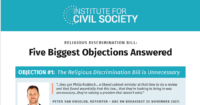SUBMISSION TO THE LEGISLATIVE COUNCIL OF THE PARLIAMENT OF TASMANIA
JUSTICE AND RELATED LEGISLATION (MARRIAGE AMENDMENTS) BILL 2018
20 March 2019
We oppose the new concept of “gender expression” being included in “gender identity” as a new basis for unlawful discrimination and for insulting or offending unlawful conduct – Clause 9 amendments (a) and (b). Because these amendments are seriously flawed and because of the rushed nature of all amendments made in the Assembly, it may be prudent to have the Bill reviewed dispassionately by the Tasmanian Law Reform Institute.
- The Institute for Civil Society strongly recommends the removal from clause 9 of the Bill of the first two amendments (a) and (b) to section 3 of the Anti-Discrimination Act 1998 (Tas). These amendments introduce a new basis for prohibiting discrimination and offence – “gender expression” – which is strangely drafted and not used anywhere else in Australian anti-discrimination law. The amendments add “gender expression” into the definition of “gender identity” in order to expand the scope of how a person can be unlawfully discriminated against or offended on the basis of “gender identity”.
- “Gender expression” is very broadly defined to mean any personal physical expression, appearance (whether by way of medical intervention or not), speech, mannerisms, behavioural patterns, names and personal references that manifest or express gender or gender identity.
- Some of the drafting of the concept of “gender expression” is redundant and simply repeats what is already in the defined term “gender identity”. But other parts of “gender expression” when added in to “gender identity” will open the door to new complaints to the Anti-Discrimination Commissioner and lawsuits alleging that the following conduct is prohibited under sections 14, 15 and 17:
– the incorrect use of and refusals to use gender-neutral pronouns like zie, ze and hir in conversations, meetings, emails and documents in schools, government services, accommodation, commerce and workplaces;
– a failure to provide (eg on forms or documents) or the refusal to use, gender neutral honorific titles like Mx, Misc and Ind and in conversations, meetings, emails and in schools, government services, accommodation, commerce and workplaces.
- Whatever problem these amendments were intended to solve was not stated in the Assembly debates, nor was any evidence produced as to the existence and extent of any such problem. In Committee stage the only argument made for these amendments by their proponent Ms Haddad was that they would “modernise the definition of gender identity and provide a related definition of gender expression” (Assembly Hansard 20 November 2018). The Attorney-General noted that the drafting was novel and unique in Australia and recommended referral to the Law Reform Institute.
- But it is clear the amendments themselves will produce significant problems if enacted.
- The controversy about the use of gender neutral pronouns and honorific titles is a well-established feature of the culture wars in North America and to a lesser extent Australia. Jordan Peterson initially made his name opposing the government’s power to penalise him for refusing to use gender-neutral pronouns when addressing a person who identified as of non-binary gender. Many others have followed and the debate about non-binary gender, which is already ideological, has become a debate about freedom of speech. The same controversies are readily foreseeable in Tasmania. But they will run beyond universities into schools and offices and the content of forms and IT system data entry. These amendments will weaponise the controversy by creating opportunities for legal threats and warfare about “names and personal references that manifest or express gender or gender identity”. That will not be a helpful way to promote respect for those who identify as a non-binary gender identity. Instead it is likely to cause resentment against and less acceptance of such people.
- Section 17 of the Tasmanian Anti-Discrimination Act 1998 has one of the lowest bars of any anti-vilification provisions in Australia. Under that section, if the amendments are passed, it will become unlawful to engage in any conduct which offends, humiliates, or insults another person on the basis of their gender expression in circumstances in which a reasonable person, having regard to all the circumstances, would have anticipated that the other person would be offended, humiliated, or insulted.
- It is readily foreseeable that a person’s or organisation’s refusal to use the correct or any gender-neutral pronouns or honorifics will be said to be conduct which offends or insults a non-cis person, leading to complaints to the Anti-Discrimination Commissioner and litigation.
- The Tasmanian Anti-Discrimination Commissioner in the past has been prepared to entertain in controversial circumstances complaints about speech said to be offensive or insulting under section 17, such as the complaint against Bishop Porteous about the Catholic Bishops’ booklet “Don’t Mess with Marriage” and complaints about street preachers expressing views critical of same-sex family structures. Those complaints all ended up by being withdrawn after many months but litigation was commenced in the latter cases. More such cases can be expected if these amendments are passed.
- It is also likely that the amendments if passed will be challenged as unconstitutional. Under the federal Constitution there is an implied freedom of political communication. As in North America, the argument of some of those refusing to use gender-neutral pronouns and honorifics will be that the gender is binary and the amendments are an attempt at ideological control of speech. They will present their objections as communicating a political position in political controversy, which will require a court to assess whether the amended law does infringe the constitutional freedom of political communication and whether it can be justified as a proportionate limitation on political communication.
- For these reasons we ask the Council not to approve the first two amendments (a) and (b) to section 3 of the Anti-Discrimination Act 1998 in clause 9 of the Bill.
- We have not had opportunity to consider the other aspects of the Bill and should not be taken to endorse them because we make no submissions in respect of them. Given the rushed nature of the amendments passed in the Assembly and the novel and flawed drafting of the particular amendments we oppose above, there would seem to be merit in referring the whole Bill or all the Assembly amendments for a thorough, dispassionate consideration by the Tasmanian Law Reform Institute.
Institute for Civil Society
PO Box 2107 | Camberwell West | VIC 3124
ABN 46 611 668 243
Australian Registered Charity








Recent Comments